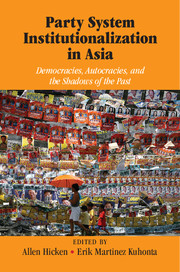Book contents
- Frontmatter
- Dedication
- Contents
- List of Figures
- List of Tables
- List of Contributors
- Acknowledgments
- 1 Introduction: Rethinking Party System Institutionalization in Asia
- 2 The Antidemocratic Potential of Party System Institutionalization: Malaysia as Morality Tale?
- 3 Institutionalized Succession and Hegemonic Party Cohesion in Singapore
- 4 Party System Institutionalization in Japan
- 5 Long in the Making: Taiwan’s Institutionalized Party System
- 6 The Making and Unmaking of the Communist Party and Single-Party System of Vietnam
- 7 The Institutionalization of the Communist Party and the Party System in China
- 8 Party System Institutionalization in India
- 9 Party and Party System Institutionalization in Cambodia
- 10 Explaining Party System Institutionalization in Indonesia
- 11 South Korea’s Weakly Institutionalized Party System
- 12 Thailand’s Feckless Parties and Party System: A Path-Dependent Analysis
- 13 Party and Party System Institutionalization in the Philippines
- 14 Party System Institutionalization: Reflections Based on the Asian Cases
- Index
- References
13 - Party and Party System Institutionalization in the Philippines
Published online by Cambridge University Press: 18 December 2014
- Frontmatter
- Dedication
- Contents
- List of Figures
- List of Tables
- List of Contributors
- Acknowledgments
- 1 Introduction: Rethinking Party System Institutionalization in Asia
- 2 The Antidemocratic Potential of Party System Institutionalization: Malaysia as Morality Tale?
- 3 Institutionalized Succession and Hegemonic Party Cohesion in Singapore
- 4 Party System Institutionalization in Japan
- 5 Long in the Making: Taiwan’s Institutionalized Party System
- 6 The Making and Unmaking of the Communist Party and Single-Party System of Vietnam
- 7 The Institutionalization of the Communist Party and the Party System in China
- 8 Party System Institutionalization in India
- 9 Party and Party System Institutionalization in Cambodia
- 10 Explaining Party System Institutionalization in Indonesia
- 11 South Korea’s Weakly Institutionalized Party System
- 12 Thailand’s Feckless Parties and Party System: A Path-Dependent Analysis
- 13 Party and Party System Institutionalization in the Philippines
- 14 Party System Institutionalization: Reflections Based on the Asian Cases
- Index
- References
Summary
No country in Asia has a longer experience with democracy and democratic institutions than does the Philippines. The first national political party, Partido Federal, was founded in 1900. Direct local elections were held under U.S. colonial auspices in 1906 followed by national legislative elections in 1907. And yet, despite its long history the Philippine party system remains stubbornly under-institutionalized – regardless of how we choose to define and operationalize the concept. The chronic weaknesses of the party system are the source of a variety of ills, according to scholars, including an acute “democratic deficit,” a lack of political accountability, an under-provision of public goods, and disillusionment with democracy among Filipino citizens. In short, the party system is one of the biggest obstacles to democratic stability and good governance in the Philippines.
In this chapter, I examine characteristics and causal factors related to the Philippine party system. Using Mainwaring and Scully’s institutionalization framework as a point of departure, I first demonstrate that the Philippines is indeed under-institutionalized (inchoate). I note and discuss apparent changes in the degree of institutionalization over time. Finally, I present an explanation for why the party system has developed as it has in the Philippines, an explanation that also accounts for the changes we observe over time. Specifically, like Hutchroft and Rocomora (2003), I argue that the development of the Philippine party system is inextricably linked to the manner in which democracy unfolded in the Philippines. Early decisions by colonial administrators and Philippine elite had the unintended consequence of entrenching a particular style of political party that has dominated the Philippine polity ever since. I argue that when the question of institutional reform has arisen in the decades since, the Filipino elite has consistently and sometimes strategically opted for institutions that were inimical to greater party institutionalization.
- Type
- Chapter
- Information
- Party System Institutionalization in AsiaDemocracies, Autocracies, and the Shadows of the Past, pp. 307 - 327Publisher: Cambridge University PressPrint publication year: 2014
References
- 13
- Cited by

